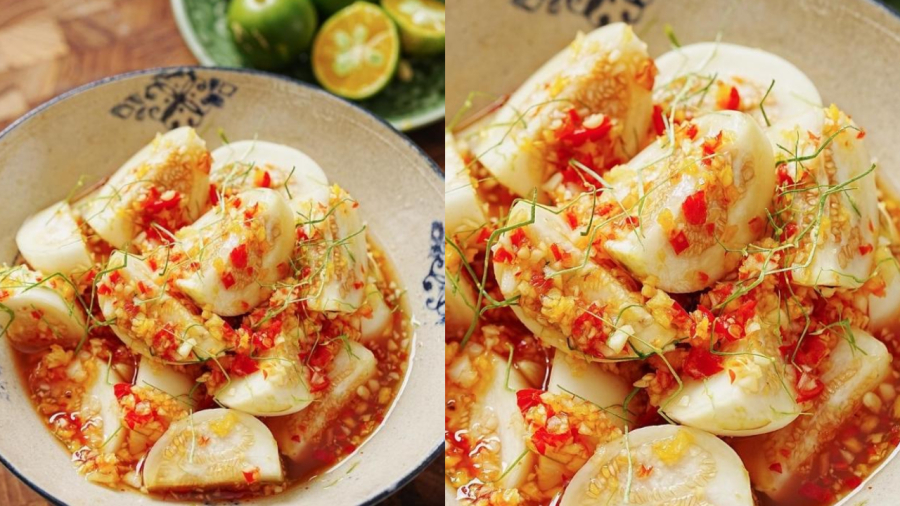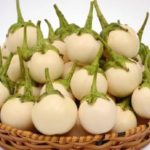Nutritional Value of Eggplants
100 grams of eggplants provide 1.5g of protein, 12mg of calcium, 0.7mg of iron, 22.1mg of potassium, 16mg of phosphorus, 18mg of magnesium, 0.3mg of zinc. In addition, it also contains copper, selenium, vitamins A, C, B1, B2, and PP.
Many people experience coughing after eating eggplants. It is believed that the seeds of the eggplant have small hairs that can cause coughing. However, no research has been published on this effect.

Pickled eggplants are a familiar dish on Vietnamese dinner tables.
An important characteristic of eggplants is that they contain the toxic substance solanine. Unripe eggplants will contain more solanine than ripe ones.
Eggplants can be eaten raw, boiled, or stir-fried. Raw eggplants can be eaten with fermented shrimp paste or fish sauce, however, it is not advisable to eat too much of this dish as raw eggplants contain toxic solanine.
Pickled eggplants are the most popular dish. The eggplants are immersed in salt and other spices to ferment, and the eggplants will have a sour flavor and can be used as a side dish with meals. To prepare them quickly, people can make a dish called “ca muối sổi xổi.”
Who Should Avoid Eating Pickled Eggplants
– People with kidney disease
When kidney function is impaired, the body’s ability to eliminate toxins decreases. Eating a lot of pickled eggplants will cause high blood pressure, water retention leading to edema, and false weight gain. In addition, eating pickled eggplants can affect the effectiveness of medications.
– People with digestive problems
People with weak stomachs should avoid eating pickled eggplants because they can easily cause digestive upset leading to diarrhea, hoarseness, bacillary dysentery, cholera, and other conditions.
People with gastritis should also not eat a lot of pickled eggplants because they contain a lot of acid, which can damage the gastric mucosa and cause gastritis.
– People with high blood pressure
A lot of salt is used to make pickled eggplants. When salt enters the body, it increases the permeability of cell membranes to sodium, causing water to enter cells, constricting blood vessels, and leading to high blood pressure. People with high blood pressure who eat a lot of pickled eggplants may experience dangerous complications.
– People who have recently recovered from an illness
According to traditional Chinese medicine, eggplants are a cold food, so people with a cold body constitution should limit their consumption and should also be careful when combining eggplants with other cold foods. It is better to eat eggplants with warm foods like garlic, chili, and lemongrass to balance the energy.
People who are weak or have recently recovered from an illness should not eat pickled eggplants.
– Pregnant women
Pickled eggplants contain a lot of salt, which is not good for the health of pregnant women. In addition, pickled eggplants contain nitrite, which can combine with amino groups in meat and fish to form nitrosamines – a harmful substance that can stimulate the formation of K cells.
Pregnant women who eat a lot of pickled foods will negatively affect the uterus and fetus. Although it is not necessary to completely avoid this dish, pregnant women should still limit their intake and avoid eating unripe or freshly pickled eggplants.
Precautions When Eating Pickled Eggplants
Even for healthy people, when eating pickled eggplants, they should pay attention to the following points to avoid negative effects on their health.
When pickling eggplants, earthenware, porcelain, ceramic, or glass jars should be used. Do not eat pickled eggplants stored in paint buckets or plastic containers.
Do not eat pickled eggplants on an empty stomach because the salt and acid content can increase the risk of gastritis, high blood pressure, and cardiovascular complications.
Each person should only eat about 50 grams of pickled eggplants and eat 2-3 times per week.

































